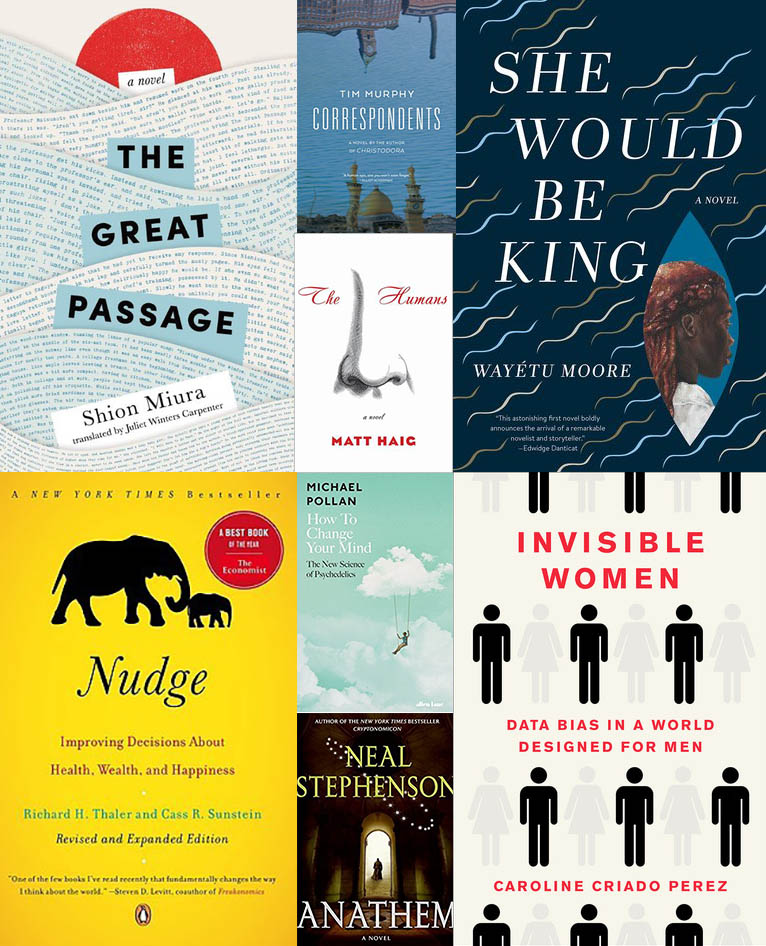
Over the past year, I’ve read 100 books. I made a deliberate effort to reach 100 because I realized I was 15 years away from the age that both my mother and my grandmother were when they died, and I had 1500 books on my to-read list. I’ve blown that up, because I still have 1500 books to go. I added as many books as I read, so I need to hang on for 15 years—at least.
The oldest story I read was a translation of Gilgamesh (~4000 years old). The earliest publication I read was The Recognitions by William Gaddis, one of the foundational novels of postmodern literature (which I’ve been reading through over several years). Gaddis’ was also the longest book I read this year at just under 1000 pages.
I balanced fiction (52) and non-fiction (48). Within fiction I balanced serious and pulp; within non-fiction I balanced business and the mind. I deliberately kept moving between topics to keep myself paying attention.
I loved many of these books. I loved them and admired the execution. Twenty earned 5 stars from me; only 13 got 1-2 stars from me. I’m getting more and more careful about my choices. Despite being a tough reviewer, I gave on average 3.7 stars. I really hated two books. Hated them. Hated one so much that I wrote a review explaining why a reader should skip the book but not the author’s productivity method, which is explained on his website (Agile Results). I use his method every day. I wanted to love his book. It doesn’t deserve anyone’s love.
Now that I’m looking over the list, I wish I had read more. I don’t think I could do right by the ideas if I read more than 100 books a year, but I feel itchy and anxious to get to the rest of my list. I have already started. I have 20 books on my “Currently Reading” list. If you are on Goodreads, let’s connect.
Here are some of my favorites from the year.
Anathem, Neal Stephenson, 2008
A novel of sacred math and science. I will read anything Neal Stephenson touches.
The Correspondents, Tim Murphy, 2019
A novel that weaves the stories of families into the stories of the experiences of two war correspondents in Iraq.
The Great Passage, Shion Miura, 2011
A novel about a beautiful passion for and dedication to language and books.
How to Change Your Mind: What the New Science of Psychedelics Teaches Us About Consciousness, Dying, Addiction, Depression, and Transcendence, Michael Pollan, 2018
Non-fiction. I really enjoyed diving deeper into a topic I thought I already knew. Surprise: I didn’t.
The Humans, Matt Haig, 2013
A novel that takes a compassionate look at humans through the mind of an alien visitor.
Invisible Women: Data Bias in a World Designed for Men, Caroline Criado-Perez, 2019
Non-fiction. I’ve given this as a gift for several people this year. I’m going to read it again on paper and mark it up. Won Financial Times & McKinsey Best Business Books of the Year. EVERYONE should read Invisible Women.
Nudge: Improving Decisions about Health, Wealth, and Happiness, Richard Thaler and Cass Sunstein, 2008
Non-fiction. Behavioral economics is fascinating, so I started with one of the best-known books, published before Thaler won the Nobel Prize in Economics in 2017.
The Overstory, Richard Powers, 2018
A novel that starts at the pace of the life of a tree then grows forward to bring together trees and those who care for them into a contemporary story. Winner of the 2019 Pulitzer Prize in Fiction.
She Would Be King, Wayétu Moore, 2018
A novel of magical realism and the formation Liberia.